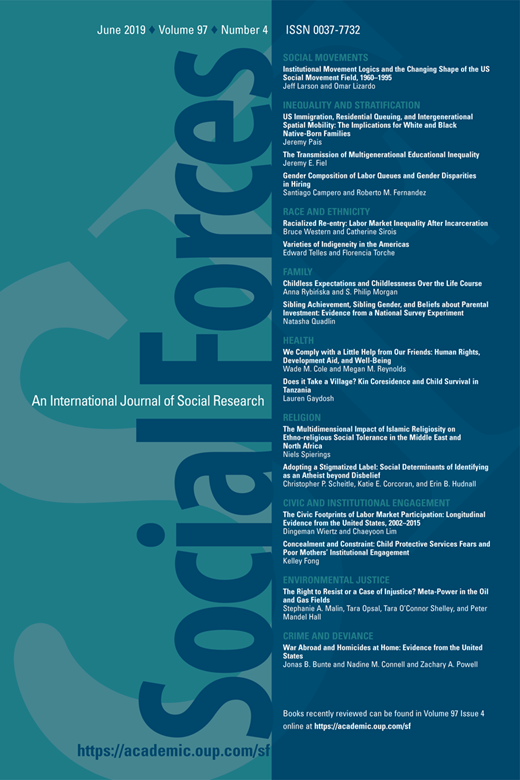Social Forces Current Issue
Review of “Hear Our Stories: Campus Sexual Violence, Intersectionality, and How We Build a Better University”
Review of “Hear Our Stories: Campus Sexual Violence, Intersectionality, and How We Build a Better University” By Jessica C. Harris Stanford University Press, 2024, 266 pages, price: $105.00 (cloth) / $26.00 (paper) / $26.00 (eBook). https://www.sup.org/books/sociology/hear-our-stories
Review of “Controlling Reproduction: Women, Society, and State Power”
Review of “Controlling Reproduction: Women, Society, and State Power” By Nancy E. Riley and Nilanjana C hatterjee Polity Press, 2023, 224 pages, price: $69.95 (cloth) / $24.95 (paper) / $20.00 (eBook). https://www.wiley.com/en-us/Controlling+Reproduction%3A+Women%2C+Society%2C+and+State+Power-p-9781509539925
Review of “The Borders of Privilege: 1.5-Generation Brazilian Migrants Navigating Power Without Papers”
Review of “The Borders of Privilege: 1.5-Generation Brazilian Migrants Navigating Power Without Papers” By Kara B. Cebulko Stanford University Press, 2025, 250 pages, price: $110.00 (cloth) / $28.00 (paper) / $28.00 (eBook). https://www.sup.org/books/sociology/borders-privilege
Review of “Righteous Sisterhood: The Politics and Power of an All-women’s Motorcycle Club”
Review of “Righteous Sisterhood: The Politics and Power of an All-women’s Motorcycle Club” By Sarah L. Hoiland, Temple University Press, 2025, 170 pages, price: $89.50 (cloth) / $27.95 (paper) / $27.95 (eBook). https://tupress.temple.edu/books/righteous-sisterhood
Review of “We Belong Here: Gentrification, White Spacemaking, and a Black Sense of Place”
Review of “We Belong Here: Gentrification, White Spacemaking, and a Black Sense of Place” By Shani A. Evans, University of Chicago Press, 2025, 232 pages, price: $115.00 (cloth) / $25.00 (paper) / $24.99 (eBook). https://press.uchicago.edu/ucp/books/book/chicago/W/bo238845176.html
Review of “The Paradox of Islamic Finance: How Shariah Scholars Reconcile Religion and Capitalism”
Review of “The Paradox of Islamic Finance: How Shariah Scholars Reconcile Religion and Capitalism” By Ryan Calder, Princeton University Press, 2024, 376 pages, price: $120.00(cloth) / $35.00 (paper) / $35.00 (eBook). https://press.princeton.edu/books/ebook/9780691258324/the-paradox-of-islamic-finance-pdf
Review of “Challenging Inequality: Variation Across Postindustrial Societies”
Review of “Challenging Inequality: Variation Across Postindustrial Societies” By Evelyne Huber and John D. Stephens, University of Chicago Press, 2024, 376 pages, price: $115.00 (cloth) / $35.00 (paper). https://press.uchicago.edu/ucp/books/book/chicago/C/bo230374231.html
Review of “Other People’s Colleges: The Origins of American Higher Education Reform”
Review of “Other People’s Colleges: The Origins of American Higher Education Reform” By Ethan W. Ris, The University of Chicago Press, 2022, 368 pages, price: $105.00 (cloth) / $35.00 (paper). https://press.uchicago.edu/ucp/books/book/chicago/O/bo162768878.html
Review of “Policing Patients: Treatment and Surveillance on the Frontlines of the Opioid Crisis”
Review of “Policing Patients: Treatment and Surveillance on the Frontlines of the Opioid Crisis” By Elizabeth Chiarello, Princeton University Press, 2024, 304 pages. price: $32.00 (cloth) / $32.00 (eBook). https://press.princeton.edu/books/hardcover/9780691224770/policing-patients
Review of “Urban Power: Democracy and Inequality in São Paulo and Johannesburg”
Review of “Urban Power: Democracy and Inequality in São Paulo and Johannesburg”By Benjamin H. Bradlow, Princeton University Press, 2024, 256 pages, price: $99.95 (cloth) / $29.95 (paper) / $29.95 (eBook). https://press.princeton.edu/books/paperback/9780691237121/urban-power
Review of “The Policing Machine: Enforcement Endorsements, and the Illusion of Public Input”
Review of “The Policing Machine: Enforcement Endorsements, and the Illusion of Public Input” By Tony Cheng, The University of Chicago Press, 2024, 240 pages, price: $99.00 (cloth) / $20.00 (paper). https://press.uchicago.edu/ucp/books/book/chicago/P/bo208342229.html
Review of “A Victim's Shoe, a Broken Watch, and Marbles: Desire Objects and Human Rights”
Review of “A Victim's Shoe, a Broken Watch, and Marbles: Desire Objects and Human Rights” By Lea David, Columbia University Press, 2024, 344 pages, price: $140.00 (cloth) / $35.00 (paper) / $34.99 (eBook). https://cup.columbia.edu/book/a-victims-shoe-a-broken-watch-and-marbles/9780231217743
Review of “Conditional Belonging: The Racialization of Iranians in the Wake of Anti-Muslim Politics”
Review of “Conditional Belonging: The Racialization of Iranians in the Wake of Anti-Muslim Politics” By Sadeghi Sahar, NYU Press, 2023, 224 pages, price: $94.00 (cloth) / $30.00 (paper) / $28.00 (eBook). https://nyupress.org/9781479805013/conditional-belonging/
Review of “Denied: Women, Sports, and the Contradictions of Identity”
Review of “Denied: Women, Sports, and the Contradictions of Identity” By Michelle J. Manno New York University Press, 2023, 240 pages, price: $94.00 (cloth) / $30.00 (paper) / $28.00 (eBook). https://nyupress.org/9781479885381/denied/
Review of “What Work Means: Beyond the Puritan Work Ethic”
Review of “What Work Means: Beyond the Puritan Work Ethic” By Claudia Strauss Cornell University Press, 2024, 372 pages, price: $130.00 (cloth) / $35.95 (paper) / $22.99 (eBook). https://www.cornellpress.cornell.edu/book/9781501775512/what-work-means/#bookTabs=4
Review of “Sin Padres, Ni Papeles: Unaccompanied Migrant Youth Coming of Age in the United States”
Review of “University of California Press” By Canizales Stephanie L. 2024, 338 pages, price: $95.00 (cloth) / $29.95 (paper) / $29.95 (eBook). https://www.ucpress.edu/books/sin-padres-ni-papeles/epub-pdf
Review of “At Home in the City: Growing Old in Urban America”
Review of “University of California Press” By Torres Stacy. 2025, 368 pages, price: $95.00 (cloth) / $29.95 (paper) / $29.95 (eBook). https://www.ucpress.edu/books/at-home-in-the-city/paper
Review of “Emergency: COVID-19 and the Uneven Valuation of Life”
Review of “University of Chicago Press” By Decoteau Claire Laurier. 2024, 272 pages, price: $115.00 (cloth) / $27.50 (paper) / $26.99 (eBook). https://press.uchicago.edu/ucp/books/book/chicago/E/bo237919570.html
Review of “The Contemporary Black Church: The New Dynamics of African American Religion”
Review of “The Contemporary Black Church: The New Dynamics of African American Religion” By Jason E. Shelton New York University Press, 2024, 352 pages, price: $32.00 (cloth) / $32.00 (eBook). https://nyupress.org/9781479824762/the-contemporary-black-church/
Review of “Not All In: Race, Immigration, and Health Care Exclusion in the Age of Obamacare”
Review of “Not All In: Race, Immigration, and Health Care Exclusion in the Age of Obamacare” By
Tiffany D. Joseph Johns Hopkins University Press, 2025, 368 pages, price: $39.95 (cloth) / $39.95 (eBook). https://www.press.jhu.edu/books/title/12819/not-all?srsltid=AfmBOorXtJXxS1Zz3aJtpoaxDwLmbTMXGrFNDZVqL1MBtOFDoYzHcYQj#book__details
Social Forces
Established in 1922, Social Forces is recognized as a global leader among social research journals. Social Forces publishes articles of interest to a general social science audience and emphasizes cutting-edge sociological inquiry as well as explores realms the discipline shares with psychology, anthropology, political science, history, and economics. Social Forces is published by Oxford University Press in partnership with the Department of Sociology at the University of North Carolina at Chapel Hill.


